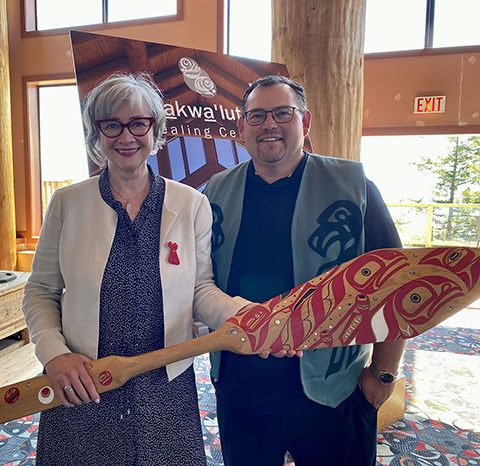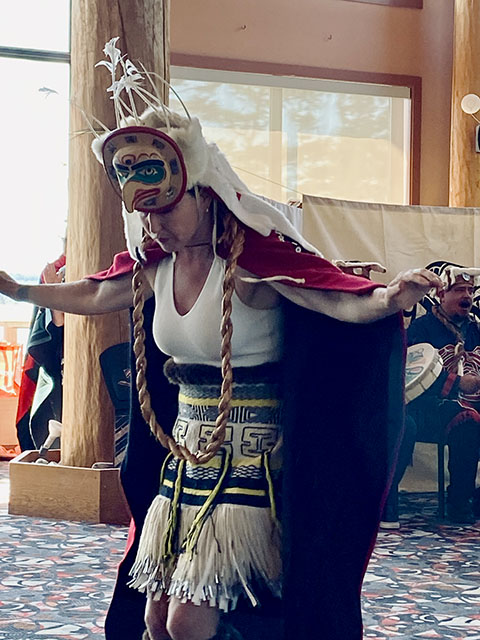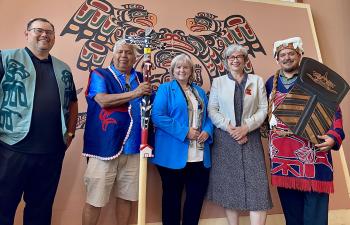Image Caption
Local Journalism Initiative Reporter
Windspeaker.com
Updated: July 19, 2024.
We Wai Kai Nation on Vancouver Island in British Columbia is converting a former resort into a year-round facility called the Tsa̱kwa’luta̱n Healing Centre.
The newly-announced Indigenous-led centre will be dedicated to supporting people in need of mental health and addictions treatment.
Eagle down drifted over those gathered to witness the announcement. Chief Ronnie Chickite of We Wai Kai shared the vision of providing access to culturally-relevant treatment.
The event July 16 began with Kwakwa̱ka̱ʼwakw dancing and drumming, with women and girls “blessing our floor” with eagle down to start this important work in a good way, said Chickite.
“They come to take away any and all negativity and bad emotions... This comes from an old and sacred time,” he said of the dance.
Hereditary Chief Shawn Decaire explained that one of the songs was shared with permission from its owner, an example of “the generosity of great people who are using our culture as a tool to help one another.”
“We've been working on this for well over the last year-and-a-half,” said Chickite, but “this vision has been there a lot longer.”
He said he’s seen such treatment centres work.
“We believe that the cultural-based approach combined with evidence-based practices can heal all people.”
He noted that many people are struggling throughout the province and “Indigenous people are definitely struggling the most. So we wanted to take a step to help.”
The clinical programming will be composed of “50 per cent western therapies and 50 per cent land-based, culturally-rooted healing, Chickite said.
This combination seeks to “meet people where they are at on their wellness journey,” said Celeta Cook, director at the First Nations Health Authority (FNHA).
“This new facility will help us achieve that by weaving together western and First Nations’ approaches to healing to provide care that is culturally safe and accessible.”
The facility will have 40 adult treatment beds, 32 of those spaces will be without fees.
The province has invested $7.9 million toward the centre’s operations and renovations.
Renovations will create two wings for client rooms, will complete roof repairs, and safety and power upgrades. The updated building will include new common areas, staff areas, counselling and group meeting rooms, clinical rooms, administrative offices, facilities for art therapy and physical activity, and a cultural programs room.
In 2023, the First Nations Health Authority in B.C. released a report that details how past trauma in Indigenous people’s lives, including intergenerational trauma, led to addiction issues.
Decaire spoke of crises leaving people on the verge of homelessness, “which means the verge of stress, which means the verge of mental breakdowns, which then leads to addictions,” he said.
“There's so many humans, in so many ways, that we can help. And today we're doing just that, collaborating between governments, unifying ourselves so that we can truly stand up, not for what's in our pockets, but for how many people we can get off of these streets.”
“I see it every single day. I've buried over a hundred people in the last four years; 100 people from the ages of 15 to 60,” he said, illustrating the urgency for the treatment centre.
Jennifer Whiteside, minister of Mental Health and Addictions, acknowledged the scope of the healing to be done.
“In the face of an unrelenting, volatile and a vicious toxic drug crisis, never was there a time when we needed to come together more strongly, more profoundly, more deeply in community to work to turn the tide in a time when it is most complicated to do that…In the midst of climate crises, global instability, economic challenges,” she said.
“People who desperately need to be loved, to be valued, to be supported through what is probably one of the worst times of their life, they're going to be able to have that support and do that healing and start that recovery journey here,” said Whiteside.

Healing is not new in this place, Chief Chickite told Windspeaker. For many years, programs were hosted in the off season, while the venue operated as a resort in the tourist season.
One of the dancers, Nagala Avis O’Brien (Kwakwa̱ka̱ʼwakw, Haida) explained to Windspeaker why culture matters in treatment approaches. Though not affiliated with the Tsa̱kwa’luta̱n Healing Centre, she’s is a cultural empowerment facilitator whose business delivered a land-based healing addictions and trauma program using the lodge facility last winter.

“Culture saves lives,” Nagala said. “I believe that the way forward for Indigenous people, for our healing, will come from reclaiming our ways of knowing, being and healing. Our way of healing is on the land, and through relationship in community, through ceremony and culture.”
“These are the things that have kept me alive on my path of recovery,” she said, “and continue to give my life meaning and purpose.”
Connection to identity and ancestors gives her “energy to keep moving forward on my path of recovery from addiction and trauma,” she said.
“Culture is a protective factor” against “all of the invisible forces of colonialism which are still very much alive and present in our world today,” she said.
Decaire also spoke of the intergenerational impact and explained the spirit of the Tsa̱kwa’luta̱n Healing Centre.
“This is a place where you truly feel shifts from the ancestors, the call from the ancestors, to view them go by, from the eagles to the whales, this true connection to our old people,” he said.
“That's what's going to give this house its identity to help people, not to just cure themselves, but to reclaim themselves, to reclaim their identity, to become one with themselves again.”
Local Journalism Initiative Reporters are supported by a financial contribution made by the Government of Canada.

